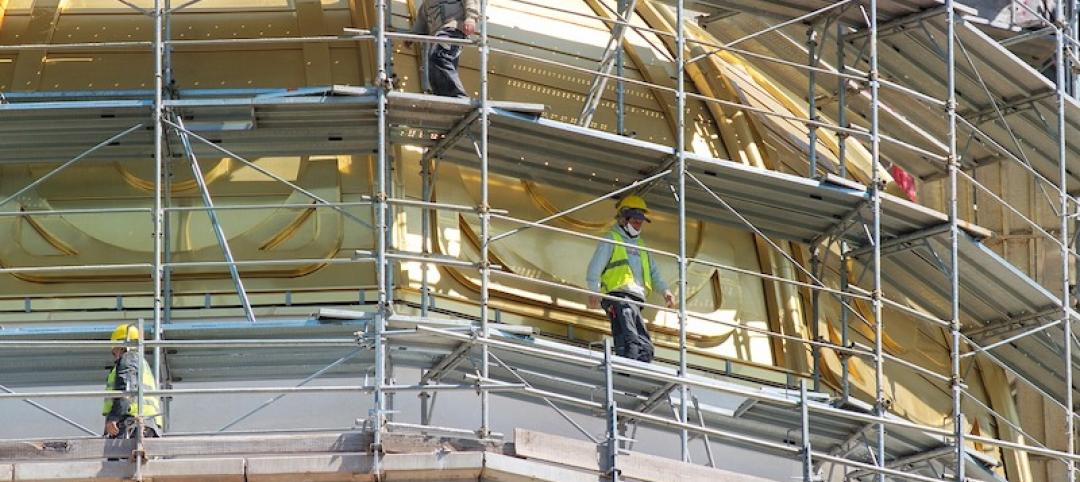Only 30% of the nation’s metro areas added construction jobs in the past year, according to an analysis of new government data that the Associated General Contractors of America released today. Association officials said construction employment in most parts of the country was being impacted by pandemic as businesses and local governments curtail planned construction projects.
“The pandemic has devastated the finances for businesses, institutions, and state and local governments, leading to widespread postponements and cancellations of construction projects,” said Ken Simonson, the association’s chief economist. “As contractors use up the funds from Paycheck Protection Program loans, even more job losses are inevitable unless the federal government provides an immediate economic boost.”
Construction employment fell in 209, or 58%, of 358 metro areas between October 2019 and October 2020. Construction employment was stagnant in 40 other metro areas, meanwhile, and only 109 metro areas—30%—added construction jobs during the past year.
Houston-The Woodlands-Sugar Land, Texas lost the most construction jobs over those 12 months (-19,800 jobs, -8%), followed by New York City (-17,300 jobs, -11%); Montgomery-Bucks-Chester Counties, Pa. (-12,100 jobs, -21%); and Minneapolis-St. Paul-Bloomington, Minn. (-10,400 jobs, -11%). Brockton-Bridgewater-Easton, Mass. had the largest percentage decline (-43%, -2,500 jobs), followed by Bloomsburg-Berwick, Pa. (-36%, -500 jobs); Altoona, Pa. (-32%, -1,000 jobs); Johnstown, Pa. (-30%, -800 jobs); and East Stroudsburg, Pa. (-30%, -600 jobs).
Dallas-Plano-Irving, Texas added the most construction jobs over the year (7,100 jobs, 5%), followed by Seattle-Bellevue-Everett, Wash. (4,700 jobs, 4%); Kansas City, Mo. (3,700 jobs, 12%); and Boise, Idaho (3,500 jobs, 13%). Walla Walla, Wash. had the highest percentage increase (25%, 300 jobs), followed by Lewiston, Idaho-Wash. (18%, 300 jobs); Oshkosh-Neenah, Wisc. (16%, 900 jobs); Fond du Lac, Wisc. (15%, 500 jobs); and Springfield, Mo. (15%, 1,400 jobs).
Association officials said the best way to curtail future construction job losses was for Congress to pass new federal coronavirus relief measures. These measures should include making new infrastructure investments, eliminating plans to tax Paycheck Protection Program loans and enacting liability reform to protect honest businesses from baseless coronavirus lawsuits.
“Construction employment is likely to continue falling in many parts of the country unless Congress quickly passes new coronavirus relief measures,” said Stephen E. Sandherr, the association’s chief executive officer. “Boosting infrastructure projects, preserving the benefits of the Paycheck Protection Program and protecting businesses from predatory attorneys will help stabilize the economy and demand for construction.”
View the metro employment 12-month data, rankings, top 10, new highs and lows, map.
Related Stories
Market Data | Jun 29, 2020
6 must reads for the AEC industry today: June 29, 2020
HQ tower features gardens on every floor and the head of Hilton talks about how his business will survive.
Market Data | Jun 26, 2020
5 must reads for the AEC industry today: June 26, 2020
Restoration of 1930s El Paso hotel completes and Arc offers tools, analytics for safe workplace re-entry.
Market Data | Jun 25, 2020
Commercial Construction Index drops amid Coronavirus pandemic, but contractors poised for near-term recovery
Contractors quickly prioritized worker health and safety, and 1 in 3 plan to hire more workers in the next 6 months.
Market Data | Jun 25, 2020
7 must reads for the AEC industry today: June 25, 2020
CDC to build the most advanced high containment laboratory in the country and architecture billings downward trajectory moderates.
Market Data | Jun 24, 2020
Architecture billings downward trajectory moderates
AIA’s Architecture Billings Index (ABI) score for May was 32.0 compared to 29.5 in April, but still represents a significant decrease in services provided by U.S. architecture firms.
Market Data | Jun 24, 2020
8 must reads for the AEC industry today: June 24, 2020
San Francisco's apartment market goes in reverse and WATG designs a solution for isolating without sacrificing social connectivity.
Market Data | Jun 23, 2020
National survey reveals pandemic's impact on college students' mental health, remote learning, families' income and more
Of 2,500 student respondents, 75% feel more anxious or stressed, 57% said they lost their summer jobs and 90% want to return to campus in the fall.
Market Data | Jun 23, 2020
7 must reads for the AEC industry today: June 23, 2020
Gyms are going bacnkrupt and leaving gaps in shopping centers and how hotels are trying to keep guests and employees safe.
Market Data | Jun 22, 2020
New House infrastructure package will provide needed investments in aging infrastructure, support economic recovery, and create jobs
The Moving Forward Act’s proposed $1.5 trillion in new investments will improve range of public infrastructure, creating needed demand for construction while making the economy more efficient.
Market Data | Jun 22, 2020
7 must reads for the AEC industry today: June 22, 2020
Construction employment rises from April to May in 45 states and the first building in the U.S. designed for post COVID-19 environment.

















